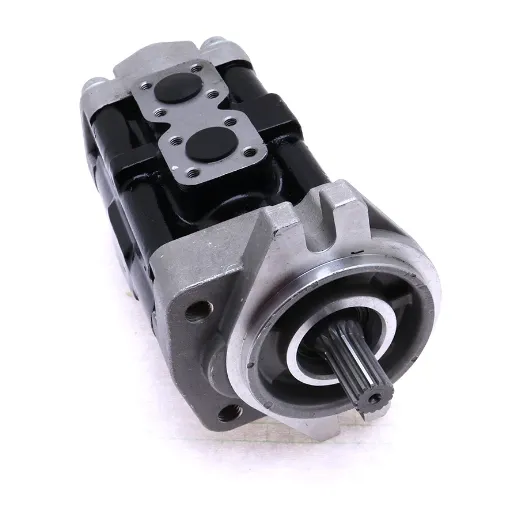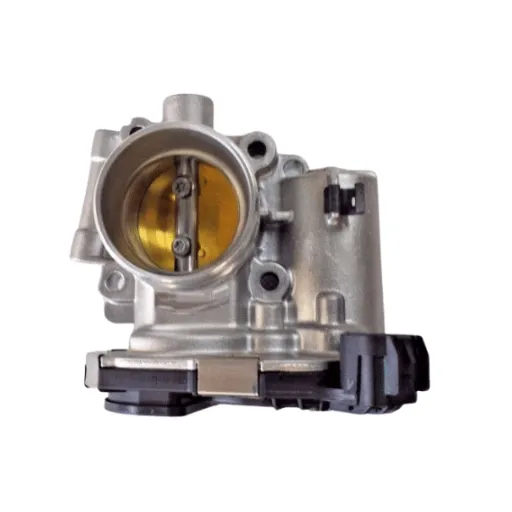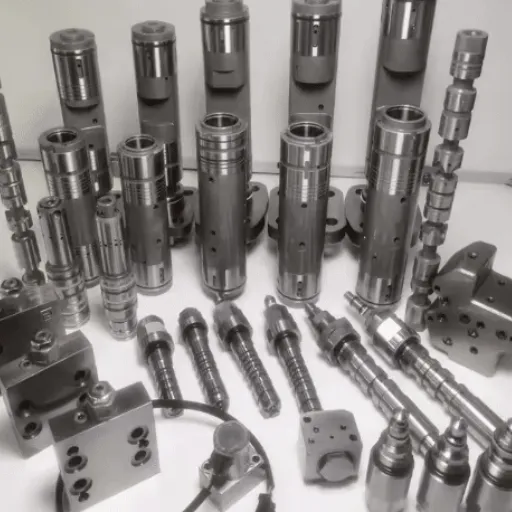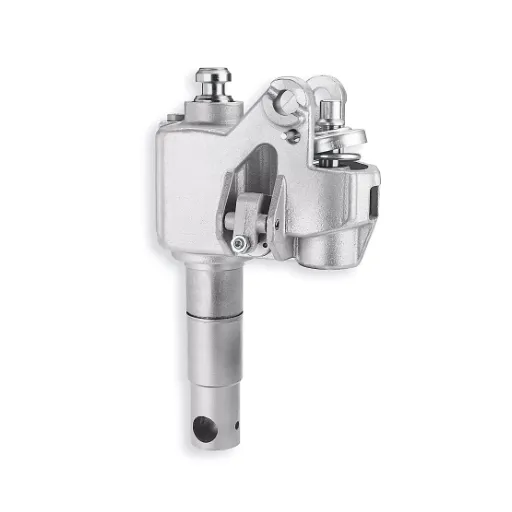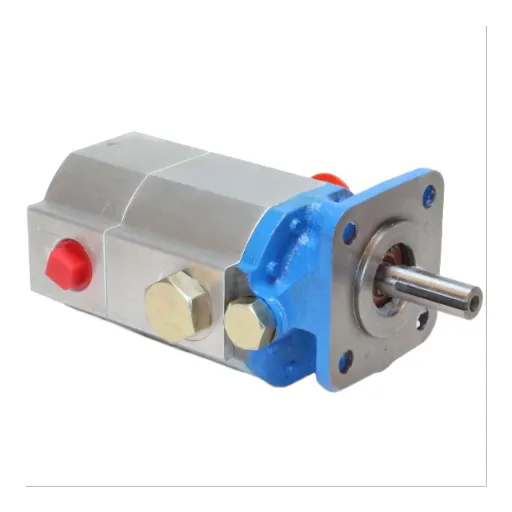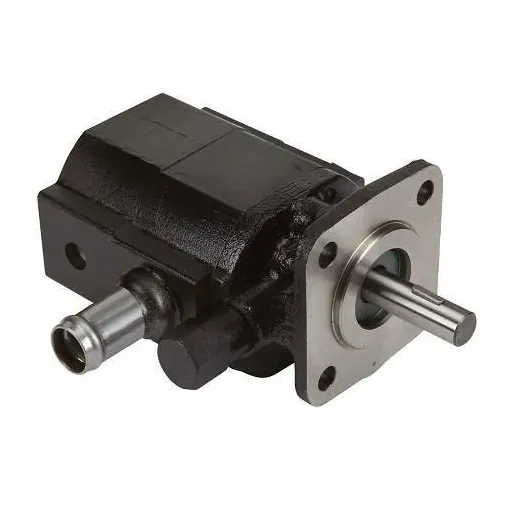When it comes to hydraulic systems, precision, reliability, and high performance are crucial for industrial and mobile applications alike. The Bosch Rexroth hydraulic pump stands as a benchmark of engineering excellence, offering innovative solutions that cater to a wide range of operational demands. This guide provides an in-depth exploration of Bosch Rexroth’s hydraulic pump technology, highlighting its features, applications, and benefits. Whether you are a seasoned engineer, a decision-maker in the industrial sector, or simply looking to deepen your understanding of advanced hydraulic systems, this comprehensive resource will equip you with the knowledge you need to make informed decisions. Stay tuned as we dissect the characteristics that set Bosch Rexroth hydraulic pumps apart in today’s competitive marketplace.
Introduction to Bosch Rexroth Plunger Pumps

What is a Plunger Pump?
A plunger pump is a positive displacement pump that uses a reciprocating plunger or piston to force fluid through a cylindrical chamber. The plunger pump ensures a very precise and uniform flow rate and, therefore, can be used for high-pressure performance requiring applications. Plunger pumps find applications in industries such as oil and gas, manufacturing sectors, hydraulics, etc., wherein precision and reliability are paramount.
The chamber creates a high-pressure seal on the plunger, thus producing the hydraulic pressure required to move liquids over extensive distances. The flow is interrupted using check valves, which open and close in tandem with the plunger movements, thus allowing a smooth, continuous flow of liquid. These pumps are meant for all kinds of fluids, including thick ones, and give the greatest efficiency in harsh conditions.
Water injection, pressure testing, and hydraulic power are some of the myriad uses where plunger pumps find great applications thanks to their rugged construction and high-pressure capabilities. Since plunger pumps give the best efficiency combined with durability, they find applications in places where precision and high performance are needed, thus adding to their usefulness in many industrial applications.
Overview of Bosch Rexroth
The company Bosch Rexroth excels in the field of drive and control technology, engineering bespoke automation solutions for industries like industrial, mobile machinery, and renewable energy. Aptly called a “company of innovations,” it offers a broad assortment of components, systems, and services specially designed to ensure higher operational efficiency and accuracy across different industries. With its hundred-plus years of experience in doing business, Bosch Rexroth marries its engineering know-how with the latest technology to provide solutions in both traditional and emerging markets.
Another core strength of Bosch Rexroth is the commitment to sustainability and innovation. Advanced digital technologies such as IoT and Industry 4.0 are incorporated by the company in their contemporary offerings for harnessing smart and connected operations. With this digital transformation, organizations can make their processes more productive, reduce downtime, and improve energy efficiency. Bosch Rexroth comes with all kinds of electric drives and systems for motion control along with hydraulic components and software solutions to meet the needs of different applications, and reliability and performance are at the top of their list.
Going through a global journey, it has numerous production sites, service centers, and distributors scattered worldwide. This gives all customers from an industry as diverse as manufacturing, construction, and offshore energy timely support and cutting-edge, tailor-made solutions to meet their specific needs. Bosch Rexroth continues to set industry benchmarks for drive and control technology with a deep commitment to quality, innovation, and customer satisfaction.
Importance of Hydraulic Pumps in Industry
Industrial operations are heavily dependent on hydraulic pumps, which convert mechanical energy into hydraulic energy. This energy powers innumerable types of machinery and systems essential for daily industrial functioning. Pumps find applications throughout industries such as manufacturing, construction, mining, and power generation, where they assist in the transference of force and the exact movement of fluids. Hydraulic pumps’ reliability and efficiency influence operational productivity and the smooth working of equipment, thereby forming the skeletal structure of modern industrial setups.
One of the main advantages of hydraulic pumps is the transmission of power under heavy loads with constant power. Hydraulics dispense smooth and precise force delivery even when conditions are variable, which are differences when compared with other modes of energy transmission. This makes it necessary to place importance where precision and response are required, such as in CNC machinery or heavy construction machinery. Other advantages include being generally very durable and adaptable, maintaining effective operation under rigorous environments, including temperature extremes and high-pressure scenarios.
Down times are reduced, energy efficiency maximized, and equipment life prolonged thanks to hydraulic pumps when industries install superior hydraulic pumps and maintain those pumps as required. The more recent designs of hydraulic pumps, and particularly the variable displacement and energy-saving models, give a big push to the sustainability cause and cost-saving programs. The wide acceptance and the continuous innovations in hydraulic pumps are a testimony to their core importance in the upliftment of industries and in rendering support to efficient operation across the globe.
Unique Features of Bosch Rexroth Plunger Pumps

Design and Engineering Excellence
Bosch Rexroth plunger pumps are top-level technology for which any compendium comprises its design and engineering. At the very heart of their philosophy lies good energy practice and sturdy construction. These pumps use materials of ever-resisting wear, coupled with manufacturing technologies, thereby offering long operational life, even in bustling industrial applications. Thanks to a modular structure that allows unparalleled flexibility in designing systems according to specific industrial needs, this pump can be easily integrated into different systems.
With the pumps of Bosch Rexroth, which employ ultramodern hydraulics, better control of pressure and flow is carried out, giving the best performance and minimizing energy consumption. Another technological innovation is that the variable displacement technology is employed to allow fluid flow to be precisely adjusted to meet demands during operation, so that no energy is wasted. Or in other words, this precision decreases the amount of energy needed when their use supports sustainability and improves the overall reliability of any installation.
In addition to providing reliable operation under high pressures and temperatures, they are equipped with competent seals and thermal management capabilities. They are Industry 4.0-compatible, allowing them to be monitored, diagnosed, and maintained predictively in real-time through an integrated smart system. The use of digital control interfaces keeps these pumps at the forefront of modern technology, ensuring the highest degree of user control, efficiency, and ease of operation. This makes Bosch Rexroth plunger pumps indispensable for modern industries involving the most complex hydraulic systems.
Performance Metrics and Specifications
Since Bosch Rexroth plunger pumps are an advanced category of pumps with very high performance and reliability design to satisfy the harsh criteria of industry, they usually run up to a nominal operating pressure of 450 bar, with the peak operating pressure reaching 500 bar, depending upon the model. Flow output rates are really flexible, from 20 to 500 liters per minute to fit applications with wide-ranging requirements. Maximum efficiency is ensured, with volumetric efficiency being higher than 92%, thereby directly leading to minimum energy losses and operating costs.
Advanced materials, such as specialty alloys and surface treatments, ensure the pumps last extremely long and resist wear. They realize a wider operating temperature range spanning from -25°C to 90°C and, hence, are apt to be installed even in extreme environmental conditions. Noise levels keep well below ISO 4412 standards so as to maintain the reputation of being one of the silent types.
It has been further elevated with integrated electronic control, allowing parameters such as pressure, temperature, and flow rate to be monitored with precision. The communication protocols of CAN-Bus and IO-Link allow a fluid automation system working under the Industry 4.0 banner to communicate with these pumps. The specification suggests the very robust and smart nature of Bosch Rexroth plunger pumps guaranteeing deadly working efficiency in heavy-duty hydraulic applications.
Technological Innovations
Advanced hydraulic technology today grants the opportunity to incorporate adaptive and intelligent systems in industrial settings. Thus the modern plunger pump, such as that by Bosch Rexroth, stands as an example of the advances in technology with the ability to execute predictive maintenance. These systems detect potential symptoms of wear, cavitation, or blockage of hydraulic circuits through advanced sensors and the real-time analysis of data. Conveying these diagnostics to an operator through communication protocols such as IO-Link and CAN-Bus allows them to take preventive measures, thereby greatly reducing avoidable machine downtimes and maintenance expenses.
The engineering of multi-circuit hydraulic pumps says a lot about the direction of technological change happening in the hydraulic sector. Multi-circuit pumps are designed to supply pressure to multiple actuators or processes simultaneously, thereby improving system-wide efficiency. Such a design comes into play when synchronized operations are essential for the application, such as in mobile machinery or complex manufacturing equipment. Moreover, these pumps retain feedback loops for pressure and flow control while energy efficiency is maintained, thus meeting the demand requirements rigorously marching toward global trends in sustainable industrial practices.
The hydraulic system could, however, be coupled with digital twin technology without experiencing friction. Through digital twin models, operators simulate the behavior of the hydraulic systems under different conditions without affecting real-world machinery. This facilitates advanced performance optimization, predictive stress testing, and lifecycle management, thereby driving decision-making processes with actionable insight. These advancements improve the performance and reliability of the systems and at the same time boost the advancement of hydraulics as a whole Industry 4.0 technology, where a manufacturing environment is shaped by high connectivity and interlinked intelligent automation.
Advantages of Using Bosch Rexroth Plunger Pumps

Efficiency and Reliability
Bosch Rexroth’s plunger pumps intend to provide efficient service almost across the entire industrial landscape. This implies careful use of high-quality materials, high precision engineering, and superior manufacturing methods, with the sole intent of building plunger pumps that conserve energy yet deliver top performance. Newer designs incorporate the latest hydraulic methods, such as minimizing flow restriction and the use of extremely low-friction surfaces, to reduce unnecessary energy losses inside the pump. Therefore, these pumps can operate for long periods with little abrasion and produce consistent output even under severely demanding working conditions.
Reliability in Bosch Rexroth plunger pumps increases with quality assurance and strong construction qualities. Each pump goes through extensive testing to ensure it withstands high-pressure situations and varying environmental conditions. With reinforced seals, tensile-strength components, and thermal stability working in its favor, the pump behaves with consistency, reducing the very occurrence of unforeseen downtime; whereas, with such reliability, unplanned downtime cannot be afforded in automotive manufacturing, aerospace, and heavy machinery industries, whereby a system failure means a huge loss in two fronts, technically and monetarily.
The pumps are also embedded with smart diagnostics and predictive maintenance solutions compliant with Industry 4.0. Real-time performance data concerning pressure, flow rate, and temperature is delivered through integrated sensors for an early warning against potential problems developing into failure. This model helps maximize overall system uptime and do the keeping of costs at bay. Minimizing repair and energy costs, Bosch Rexroth plunger pumps are this viable solution promising uncompromised performance and durability in the long term.
Cost-Effectiveness in Operations
When it comes to cost efficiency, Bosch Rexroth plunger pumps stand head and shoulders due to their cutting-edge engineering and modern design, which over time brings about reductions in operational costs. By intelligent integration of optimized hydraulic systems and smart control technologies, these pumps achieve energy savings without compromising system performance. Energy savings are also attributed to the pumps’ ability to regulate flow rates and pressure with high accuracy, ensuring that energy is not wasted unnecessarily, irrespective of the nature of the industrial applications.
Inferior and unplanned downtime is another pest affecting operational financial stability, but it could be curtailed by the sturdy design of these pumps and their predictive maintenance features. Embedded sensors within these pumps perform real-time monitoring and give early warnings of abnormal conditions such as pressure and temperature fluctuations, allowing operators to rectify situations before they evolve into significant repair costs or complete system shutdowns. Reducing the cost of maintenance and repairs maximizes operational financial viability, thus bringing production lines to greater productivity.
Furthermore, since Bosch Rexroth plunger pumps are vastly made out of abrasion-resistant materials combined with a precision-engineered design that promises performance even under the most severe environment, the pumps thus deter frequent replacements and lengthen the order of the equipment’s life, accordingly harvesting greater ROI over time. In short, by bringing together the highest grade of durability, energy efficiency, and intelligent fault detection, these plunger pump brands provide industries the most cost-effective solution to yield hydraulic systems at no expense to reliability or performance.
Versatility Across Applications
These advanced hydraulic pumps are specifically prepared to work well in an array of applications, thereby assuring a certain level of adaptability and reliability required against the settings of different industries. In terms of construction, they carry a quite durable structure reinforced with contemporary technologies to be a fitting answer to many operational challenges. These are a few application domains where hydraulic pumps outline their benefits:
- Manufacturing and Production Lines: The pumps maintain pressure and flow rate in a consistent manner, which is vital to ensure smooth operation of automated systems and assembly lines. Data suggests a 30% drop in downtime when these pumps are used in place of conventional pumps.
- Oil and Gas Industry: These pumps are designed to tolerate extreme conditions in industry settings across upstream and downstream operations, embracing drilling, refining, and transport processes. Their corrosion-resistant parts keep them in working condition with abrasive fluids.
- Agricultural Irrigation Systems: Optimizing irrigation flow about pressure considerations, these pumps are tailored to reduce water wastage up to 25% as an result of field tests; they also perform as energy savers.
- Water and Wastewater Treatment Facilities: Pumps take inter-circulation and inter-transfer measures critical to pump functions, ensuring the plant’s conformance to water quality standards. Institute of Industrial Technology studies indicate that this technology brings down energy consumption in municipal plants by nearly 20%.
- Construction and Heavy Machinery: Designed for high-pressure, heavy-duty use, these pumps improve excavators, cranes, and other hydraulic machinery, thereby extending the working life of such machinery by an average of 15%.
By addressing the distinct requirements of such varied applications, these hydraulic pumps prove to be an indispensable asset for modern industries in need of efficient and reliable solutions.
Applications of Bosch Rexroth Plunger Pumps

Industrial Applications
Because of precision engineering and the ability to handle high pressures with efficiency, Bosch Rexroth plunger pumps are critical in many industrial processes. This pump setup finds widespread application in manufacturing plants where hydraulic power drives machinery for metal forming, injection molding, and pressing operations. These pumps are used in injection molding to exert force for the injection of molten material into molds, ensuring precise and consistent execution of mass production.
By way of advanced control systems, these pumps can manage flow and pressure with extreme accuracy. Industries such as oil and gas make use of this in hydraulic fracturing and pipeline operations. Moreover, in heavy machining operations, Bosch Rexroth plunger pumps keep hydraulic pressures constant for machining accuracy, thus extending downtime and equipment life.
That more than 25% energy saving can be achieved by using Bosch Rexroth pumps due to their strictly optimized designs coupled with energy recovery. This factor, further, reduces the operating cost and simultaneously complies with sustainability goals by reducing overall energy consumption. These are the attributes on which the productivity and reliability of diverse industrial sectors depend.
Mobile Equipment Usage
With the advent of mobile equipment, it has become an essential part of any industrial or construction operation in these modern times. These systems are skilled at carrying out highly specialized tasks within harsh environments, thereby serving an array of purposes across various sectors. The pioneer in hydraulic and electronic developments for mobile machinery that integrates with equipment like excavators, loaders, and agricultural vehicles is none other than Bosch Rexroth; and these rough designs and finely structured components allow high operational efficiency, even when all environmental factors are against it.
Using the most advanced control technology, the mobile equipment now features intelligent systems that monitor and optimize the equipment’s performance in real time. On the one hand, hydrostatic drives enable advanced variable speed control, ensuring precise maneuvering and low energy consumption. On the other hand, data collected through sensors could be analyzed and used to forecast maintenance, thereby preventing unplanned interruptions in operations. Being a digitalization advocate, Bosch Rexroth ensures that mobile equipment solutions align with Industry 4.0 for data-driven operations and remote diagnostics.
At present, mobile machinery is designed to be sustainable, hence able to curb emissions and fuel consumption. Electrified drive systems and hybrid technologies are on the rise, thereby cutting down the dependency on fossil fuels. Bosch Rexroth has been an active factor in propounding energy-efficient solutions, including electrohydraulic controls that smooth operations and lessen power demand. Through these improvements, mobile equipment shall go a step beyond with compliance to the topmost tier environmental regulations while proving measurable savings in total costs, hence worthy of fulfilling both economic and ecological ends.
Fluid Power Systems
Fluid power systems encompass prominent technologies concerning the transmission and control of energy through a pressurized fluid, generally hydraulic oil or compressed air. These systems are at the center of many industrial and mobile applications, where machinery performs heavy, precise operations with ease. These may be distinguished into two main types: hydraulic systems that employ liquids such as oil to produce high-force outputs and pneumatic systems using compressed air for lighter and faster functions. Fluid power systems are, and will remain, essential in manufacturing, construction, agriculture, and aerospace industries due to their unparalleled power density, reliability, and versatility.
Some of the fundamental advantages of fluid power systems are that they may amplify relatively minor inputs into significant outputs. Pumps, along with valves and actuators, in a hydraulic system can convert a small mechanical or electric input into highly controllable and forceful outputs for driving heavy loads or applying almost unconceivable force in small places. Similarly, pneumatic systems work best in performing quick tasks that are repetitive in nature, where the speed and flexibility of operation go hand in hand; pneumatic systems can be used basically on assembly lines or in material handling tasks. However, the systems must be appropriately engineered and maintained regularly for it to perform efficiently and at its highest competence; leaks, contaminants in the system, and or selection of wrong fluids may all negatively affect the efficiency of a fluid power system.
Intelligent control technology has revolutionized fluid power systems. The newer designs employ intelligence and embed sensors, electrohydraulic controls, and state-of-the-art software to monitor parameters like system performance and energy consumption optimally in real-time. For example, pumps with variable-speed drives can limit wasting energy by producing in response to system demand, thus greatly saving on energy costs and operational expenses. Such systems are then Industry 4.0 compatible for remote monitoring and predictive maintenance, facilitating the flow of information toward minimal downtime and maximum system performance. By merging the classic fluid power theory and mechanical know-how with the latest digital advances, modern fluid power systems are ever-evolving to meet the precise needs of high-performance applications and stringent environmental regulations.
Maintenance Tips for Bosch Rexroth Plunger Pumps

Routine Maintenance Practices
- For preferential performance and life of Bosch Rexroth plunger pumps, maintenance routines have to be performed flawlessly and strictly adhering to manufacturer instructions. The important ones are:
- Checks are Regular on Components: Carry out an intensive visual check of all components of the pump, seals, hoses, and fittings for wear, leakage, or damage. Immediate correction of their appearances could prevent them from gradually deteriorating and incurring greater system failure.
- Oil Monitoring Procedure: Importance depends on the hydraulic oil used, as far as system efficiency and life of the various components of plunger pumps are concerned. Assessing such parameters as the cleanliness of the oil, its viscosity, and contamination level from time to time would be very useful. Evaluation of the status of oil in terms of particle contamination or water ingress using oil analysis kits should be carried out to meet ISO cleanliness standards.
- Change or Maintenance of Filters: Depending on the circumstances, filters are to be changed or cleaned to prevent clogging and to allow optimal fluid flow while minimizing contamination opportunities into sensitive pump components, which may cause rapid wear or affect efficiency.
- Regulate Pressure and Temperature: Pressure and temperature must be maintained at a level recommended by the technical specifications of the pump. Any fluctuation beyond the recommended parameters would lead to mechanical stress, thus reducing the durability and performance of the system.
- Bearing and Lubrication Check: Check for bearing lubrication adequacy and any signs of wear. Poor lubrication will cause friction, and the friction, through heat, will destroy internal parts too soon.
- Scheduled Overhauls: Plan for regular overhauling of the system in maintenance schedules as dictated by the intensity of operation and the recommended intervals. This involves disassembling the pump to clean its internal components and replacing worn parts, followed by reassembling the pump by means of certified tools and techniques.
In this case, routine maintenance, coupled with predictive analytics and real-time monitoring systems, provides a means of being proactive such that the reliable functioning of the system is maintained, while causing minimum interruptions of unplanned downtimes.
Extending the Lifespan of Your Pump
To achieve extended pump life, advanced techniques must be supplemented with routine maintenance. One of the major considerations for such a technique is operating under conditions that emphasize minimizing wear and tear on the pump system. Alignments that are off, without considering load balancing or consistency in fluid viscosity, bring about excessive wear to the moving components. VSDs have another important utility in adjusting flow rates and cutting power consumption to lessen thermal and mechanical stresses.
Predictive maintenance practices are another aspect; one should utilize them to catch early indications of component degradation-vibration analysis, thermography, or oil classification testing. Such techniques will provide data to inform the decision before losing equipment. The installation of industry-standard condition monitoring systems thereby adds to the theoretical reliability and performance of a pump, providing real-time diagnostics and alarm outputs to abnormal operating conditions.
Quality-based materials and coatings can be invested heavily to prevent corrosion and abrasion, much more so in pumps exposed to corrosive chemicals or abrasive fluids. Of course, then, again, properly calibrated auxiliary systems of seals and bearings are a priority to resist leakage and frictional losses.
By bringing in such practices along with technology-level advancements in pump technology, organizations can witness long-term operational efficiency, lower lifecycle costs, and the highest utilization of their pump assets.
Frequently Asked Questions (FAQ)
Q: What is a Bosch Rexroth plunger pump?
A: A Bosch Rexroth plunger pump is a type of hydraulic pump that utilizes plunger technology to create high pressure and flow rates. It is widely used in industrial applications due to its efficiency and reliability in transferring fluids.
Q: What are the advantages of using a Bosch Rexroth plunger pump?
A: The advantages of using a Bosch Rexroth plunger pump include high efficiency, excellent performance under high pressures, durable construction, and the ability to handle a wide range of fluids. Additionally, they are designed for easy maintenance and long service life.
Q: In which applications are Bosch Rexroth plunger pumps commonly used?
A: Bosch Rexroth plunger pumps are commonly used in various applications, including hydraulic systems, mobile machinery, and industrial equipment. They are ideal for applications requiring high pressure and precise fluid control.
Q: How do you maintain a Bosch Rexroth plunger pump?
A: To maintain a Bosch Rexroth plunger pump, regularly check fluid levels, inspect for leaks, and replace worn parts as needed. It is also important to follow the manufacturer’s guidelines for maintenance schedules and procedures to ensure optimal performance.
Q: What is the typical lifespan of a Bosch Rexroth plunger pump?
A: The typical lifespan of a Bosch Rexroth plunger pump can vary based on usage and maintenance, but with proper care, they can last many years. Regular maintenance and timely replacement of worn components can significantly extend their lifespan.
Q: Can Bosch Rexroth plunger pumps be used in mobile applications?
A: Yes, Bosch Rexroth plunger pumps are well-suited for mobile applications. Their robust design and high efficiency make them ideal for use in construction machinery, agricultural equipment, and other mobile hydraulic systems.
Q: What should I consider when selecting a Bosch Rexroth plunger pump?
A: When selecting a Bosch Rexroth plunger pump, consider factors such as the required flow rate, pressure ratings, fluid compatibility, and installation space. It’s also important to evaluate the pump’s efficiency and maintenance requirements.
Q: Are Bosch Rexroth plunger pumps energy-efficient?
A: Yes, Bosch Rexroth plunger pumps are designed to be energy-efficient. Their advanced technology allows for optimized performance, which can lead to reduced energy consumption compared to traditional hydraulic pumps.




